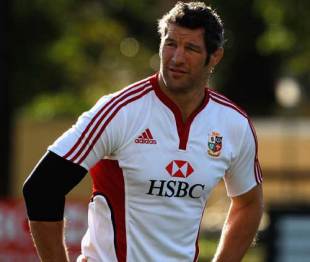|
English Rugby
Shaw hit outs at physical focus
Scrum.com
October 22, 2009

Shaw says players' bodies can't keep up with demands
© Getty Images
Enlarge
England lock Simon Shaw has weighed into the physicality debate, claiming injuries are being caused by unrealistic expectations on players and ball skill is being sacrificed for "gym monkeys". Shaw insists the sport is suffering from the emphasis on size over technique as England prepare for their autumn schedule without six certain starters - all lost to injury. The absentees include an entire front row and an alarming number of shoulder injuries, reigniting the debate over player welfare that raged during a brutal Lions tour to South Africa just four months ago. It has been suggested that the human body is struggling to meet the demands of the modern game, particularly in the tackle area. Shaw, himself returning from a fractured metatarsal and likely to miss England's first two Tests against Australia and Argentina, has called for a rethink. "There is an argument that people are spending too much time in the gym, creating more of an athlete than a rugby player," said the 36-year-old Lion, who hopes to be fit to face New Zealand on November 21. "But there is a limit to how far you can stretch your body. There's a lot of pressure, especially on the young guys coming through, to be fitter, stronger and faster. That in turn makes them train harder in the gym to be physically stronger than the player who is currently holding that position. "But they should look at guys like Lawrence Dallaglio and Serge Betsen. Serge Betsen is not the strongest man in the world, he doesn't lift a lot of weights. He's not even the fittest guy on the training pitch. "But when he goes out playing he never stops - he's got an incredible engine. Lawrence as well was never that great in the gym. "We shouldn't be trying to create gym monkeys with technique, we should be trying to create rugby players. We should be looking more at the skill side of the game rather than the physical. I hope we don't go down the route of using American football style padding. The subtleties of the game are still there and we should be looking at them a bit more." Premier Rugby Ltd, the umbrella organisation for the 12 Guinness Premiership clubs, keep detailed statistics on injury levels dating back to 2002. Up until the 2007-8 season the numbers remained static - last term's figures are currently being collated - yet that will prove scant consolation to Martin Johnson as he considers his dwindling options. Shaw believes the problem is exaggerated by the unrealistic demands made of players and cites Jonny Wilkinson's shocking injury record since 2003 as an example of the price to be paid. "I don't necessarily think the game is the cause of all the injuries, rather the length of the season," said the veteran of 52 caps. "Everyone bangs on about the amount of games people are expected to play, I don't even think it's that. It's the expectation on the players to be fit for an entire season. Whether they are playing or not is almost irrelevant. "I don't want to be critical of the system but you meet up very early on in the season and the expectation is that you have reached a certain level of fitness by that stage. "It's like the Jonny Wilkinson syndrome when he would train through his summer holidays. People question Jonny's fitness record but that might be as a result of the amount of training he did." PRL chief executive Mark McCafferty has stated that within the next month the injuries sustained so far will be collated and compared to the same stage last season. "The Premiership is more fiercely contested and competitive than ever before," McCafferty said. "The intensity of the competition has gone up and that's why we're compare last season's injury data with the opening weeks of this season. "A few high-profile players have picked up injuries and that's perhaps why this subject has had the coverage it has. Our job is not to react to the headlines but to study the data and that's what we'll do." © Scrum.com
|
Live Sports
Communication error please reload the page.
-
Football
-
Cricket
-
Rugby
-
- Days
- Hrs
- Mins
- Secs
F1 - Abu Dhabi GP
Abu Dhabi Grand Prix December 11-131. Max Verstappen ()
2. Valtteri Bottas (Mercedes)
3. Lewis Hamilton (Mercedes)
4. Alexander Albon ()
5. Lando Norris ()
6. Carlos Sainz Jr ()
-
ESPNOtherLive >>
Golf - Houston Open
Snooker - China Open
Tennis - Miami Open

